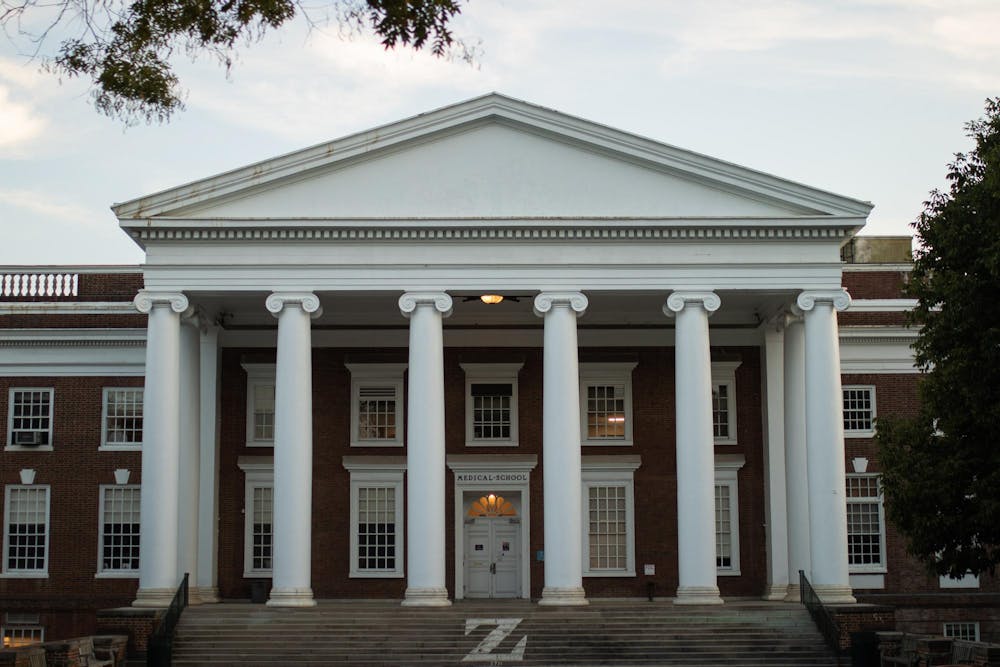At its most recent meeting Friday, the Faculty Senate discussed recent allegations of a retaliatory culture within the University of Virginia’s School of Medicine. Dr. Stephen Culp, chair of the School of Medicine Faculty Senate and assoc. Medicine professor, presented a timeline of faculty concerns and interactions with the administration before the senate heard updates from administrative representatives and senate subcommittees.
These allegations came from 128 School of Medicine faculty members who signed a letter of no confidence sent to the Board of Visitors Sept. 5. In the letter, the signers demanded the removal of both Craig Kent, chief executive officer of U.Va. Health and Melina Kibbe, dean of the School of Medicine, Medicine professor and chief health affairs officer.
In the letter, faculty alleged that Kent and Kibbe fostered an environment compromising patient safety and created a “culture of fear of retaliation” by subjecting faculty who voiced concerns about patient safety to threats and harassment. The Cavalier Daily has been unable to independently verify any of the allegations presented in the letter of no confidence.
At the Faculty Senate meeting, Culp presented a timeline of concerns raised by the School of Medicine faculty to the administration in regards to Kent and Kibbe, dating back to September 2021. He said that culture issues, some isolated to select departments but others more widespread, have infringed on the faculty’s ability to conduct research and to mentor junior faculty, residents and students. He said the issues within the School of Medicine are not new, and that the administration has known about them and not addressed them sufficiently.
“The narrative that this is a surprise or that it has been handled is completely false,” Culp said. “And the narrative that it did not reach the highest level of University administration is false. They have known about this for quite some time.”
According to Culp’s timeline, the first event relevant to School of Medicine faculty concerns over Kent and Kibbe was a U.Va. Physicians Group email to University President Jim Ryan sent Sept. 2021 claiming no confidence in Kent. The timeline said that in fall 2023, faculty sent more than four open letters to Kent and Kibbe raising concerns about the culture of the School of Medicine, as well as changes made to primary care practices. In particular, Culp cited faculty concerns about outpatient care service One Team United on Access, which he said infringed on faculty’s ability to conduct academic research and mentor junior faculty, students and residents.
Culp said that School of Medicine Faculty Senate representatives had multiple meetings with administrators in January, including Ian Baucom, executive vice president and provost, and Maite Brandt-Pearce, vice provost for faculty affairs. Culp said that at these meetings, representatives spoke about a “culture of fear and retaliation,” which he said included denied promotions, stripped titles and forced retirements as retaliation for voicing discontent towards school leadership.
Assoc. Education Prof. Brian Pusser started a motion for the Faculty Senate to create a resolution responding to the issues within the School of Medicine and the external review into the allegations — initiated by the administration and the Board of Visitors — that will be conducted by law firm Williams & Connolly.
Though the specifics of the resolution have yet to be written, Pusser spoke about a lack of transparency from the administration, especially considering that the results of the Williams & Connolly will not be seen by the senate nor the public. Multiple speakers advocated for the University to prioritize the American Association of University Professors’ guidelines and principles for shared governance — the idea that faculty should have influence over the direction of a university.
The motion passed, with the language saying that the resolution will be drafted “as soon as possible.” Once drafted, the senate will subsequently vote on whether to approve the resolution.
At multiple points in Culp’s presentation and the subsequent question and answers period, faculty senators and others in attendance voiced concerns about the retaliatory culture Culp alleged existed in the School of Medicine. Some said they were concerned about whether the administration would also retaliate against faculty in other schools in the event that similar issues arose. Culp agreed, saying that a resolution on the subject should seek to get a broader response from the University and not limit its scope to the School of Medicine.
“What I fear is that this is not going to just be a School of Medicine issue,” Culp said. “What happens when another school has an issue?”
Later in the meeting, Brie Gertler, deputy provost and senior vice provost for academic affairs, spoke briefly about Williams & Connolly’s investigation into the issues at the School of Medicine. She encouraged all faculty members to be open and engage with investigators, stating that Baucom and Ryan will not tolerate any retaliations against faculty based on what they tell the law firm.
“I do want to encourage everyone to be candid and straightforward with the investigators,” Gertler said. “[Ryan] and [Baucom], have made it very clear that they will not tolerate any kind of retaliation, and I hope that you will feel comfortable talking to [Williams & Connolly].”
Maïté Brendt-Pierce, vice provost for faculty affairs, then spoke about ongoing policy revision processes, including faculty search and promotion processes. Brendt-Pierce also said administrators are revising the institutional faculty disciplinary policy — which was discussed at the last Senate meeting as well — to ensure that faculty members’ rights to free expression are preserved.
Later in the meeting, Jennie Knight, assoc. vice provost for faculty development and director of the Center for Faculty Wellbeing and Development — a program that offers resources and opportunities to faculty members — introduced ongoing and future projects for faculty wellbeing on Grounds.
The senate’s executive committee will meet Oct. 4, with the full senate set to reconvene Oct. 18 at 2 p.m. in Bavaro Hall.







